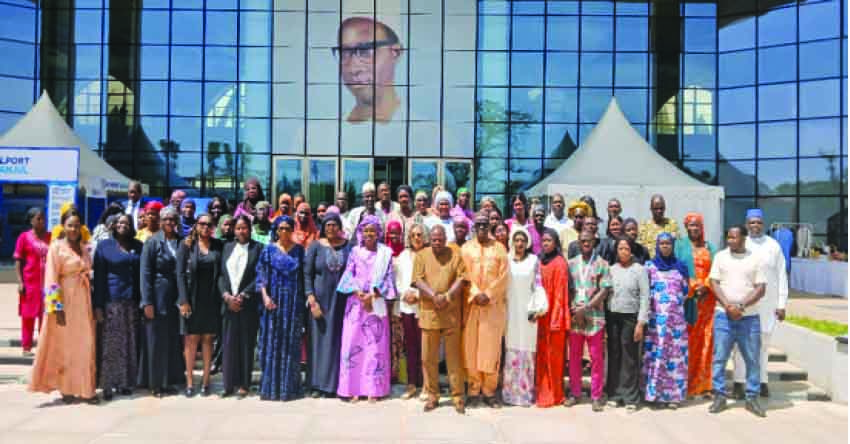Banjul, 27th February 2025: The ECOWAS National Training Workshop on Prevention and Response to Gender-Based Violence (GBV) and Sexual Harassment, for judicial, health and social actors, has recently concluded.
The workshop aimed to strengthen institutional responses and equip key actors with essential skills to combat GBV.
In her opening remarks of the 3-day event on 20th February, at Sir Dawda Kairaba Jawara Conference Centre, the Honourable Minister of Gender, Children, and Social Welfare, Fatou Kinteh, said GBV remains a critical issue in West Africa, with profound implications for the rights and well-being of women and girls. To address this challenge, she said ECOWAS has developed strategic frameworks, including the Regional Strategy to prevent and respond to Sexual and Gender-Based Violence and the ECOWAS Policy on Sexual Harassment in Workplaces and Educational Institutions
She further described GBV as a violation of human rights that transcends age, class, ethnicity, and geography, affecting individuals in both urban and rural communities.” She stated.
Minister Kinteh said key outcome of the workshop would be the formulation of a national roadmap for the effective implementation of the ECOWAS Regional Strategy to prevent and respond to Sexual and Gender-Based Violence and the Elimination of All Violence against Women and Girls, as well as the ECOWAS Policy on Sexual Harassment in Workplaces and Educational Institutions.
“This training serves as a crucial step toward realising the commitments made at the regional level and ensuring a structured approach to eliminating gender-based violence in The Gambia and across the ECOWAS region,” she stated
In her closing statement on 22nd February, the Permanent Secretary at the Ministry of Gender, Children, and Social Welfare, Roheyatou Kah, highlighted the ministry’s unwavering efforts to combating GBV in The Gambia. “Over the years, we have implemented a range of initiatives aimed at preventing violence, supporting survivors, and holding perpetrators accountable,” she added. The efforts, she highlighted, included policies and legal frameworks that were formulated and enacted to provide preventive and response measures in the fight to eliminate Gender Based Violence
Madam Kah recognised countries such as Ghana and Nigeria as making strides in using digital tools for GBV reporting, providing survivors with safer avenues to seek help. She also made reference to Liberia’s specialized GBV courts which have significantly improved prosecution rates for sexual violence cases. She said they can learn from these initiatives and adapt them to national context to strengthen their response mechanisms.
The Permanent Secretary pointed out that combating gender-based violence is not the responsibility of one ministry or organisation; that it requires a coordinated, multi-sectoral approach involving government agencies, civil society organisations, religious and traditional leaders, the private sector, and communities. She said it also requires efforts to challenge harmful norms, dismantle systemic barriers, and work together to create an enabling environment for gender equality and social justice.
The programme officer, Gender and Civil Society, ECOWAS Gender Development Centre (EGDC)Dr. Odile Ndoumbe Faye saidthe workshop would allow judicial, health and social actors to understand the concepts, causes, effects and consequences of gender-based violence.
“The different stages of the holistic judicial, medical and psychosocial care of survivors of GBV from admission to health services and judicial services to the closure of the medical and judicial file and socio- economic reintegration, educational or professional. “she noted .
She stated that particular emphasis will be placed on the collection, centralization and sharing of survivors’ data while ensuring the confidentiality and respect of the privacy of individuals.
Dr. Odile said this ECOWAS national training workshop is among the priority actions identified by the Country Delegates during the ECOWAS Regional Training Workshops held in June 2024 in Lomé, Republic of Togo. The action plans proposed at the end of these workshops included the multiplication of the Lomé training in order to allow a wide dissemination of the tools as well as the definition of national roadmaps for the effective implementation of regional policies to combat gender-based violence and sexual harassment.
The lead consultant, Fatou Jagne Senghore a renowned lawyer and human rights activist. Indicated that the training is in the right direction, noting that at the end of the training participant are expected to share the information.
She presented on the legal aspect of the sexual and Gender Based Violence and the laws that prohibits it in both regional and globally level.
Mrs RoheyNjie- Sawanehtook the participants through health aspect of the Sexual and Gender Based Violence and early reporting of gender-based violation cases to the health facilities.
Sarjo M. Camara






